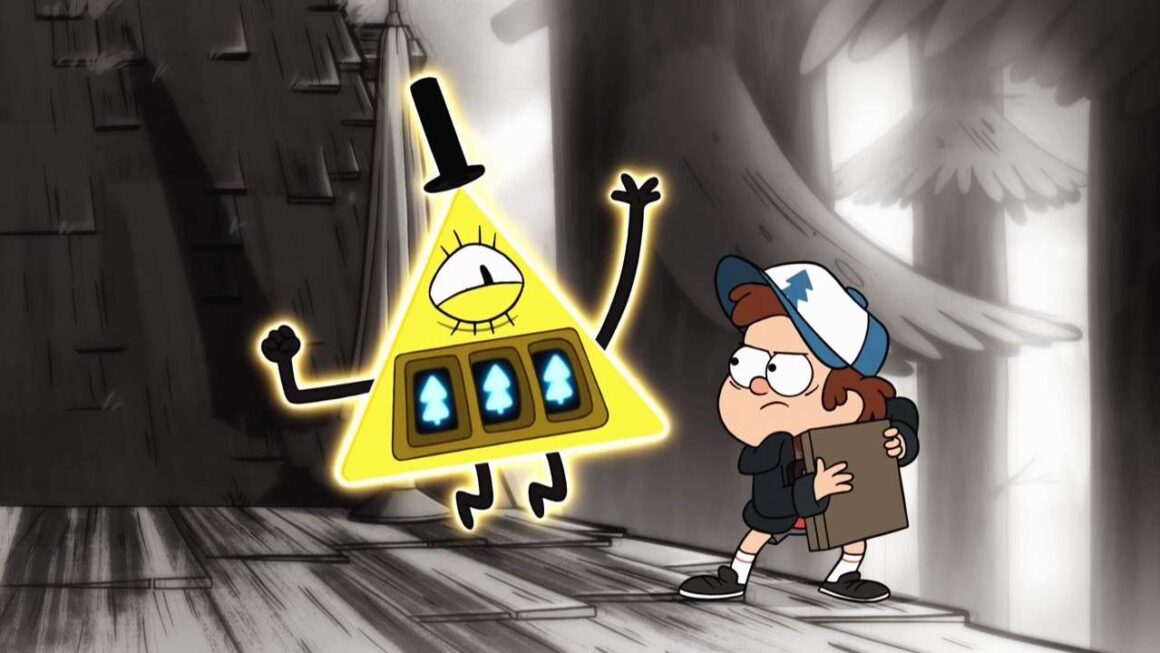In the Gravity Falls episode Sock Opera, an overworked and sleep-deprived Dipper Pines does something against his better judgment. He makes a deal with Bill Cipher.
He’s exhausted, he’s frustrated that Mabel isn’t helping him uncover the mystery of an abandoned laptop. He’s desperate for answers about the author of the journals. Dipper isn’t in a good headspace and Bill knows exactly how to weaponize it.
One thing fans have questioned is whether Bill failed to uphold his end of the deal. Where he gives Dipper a clue in exchange for one of Mabel’s puppets (aka her brother Dipper who Bill turns into his puppet). The answer is complicated. It’s hard to define a “deal” with a dream demon who treats rules like a toy.
What Bill Actually Promised
One thing that’s important here is noticing what Bill actually says in the episode. He never promises to give Dipper a password or a hint. All he says is: “I can help you, kid.” That’s it. The rest comes from Dipper’s anxiety which causes him to jump to the wrong conclusions.
Plus, keep in mind that Bill appears after Dipper closes his eyes. When he opens them, a countdown pops up on the laptop threatening to delete all of its data. Dipper immediately begins to panic since he hasn’t figured out the password to log in.
Once the countdown starts, then Bill shows up. If you pay attention to the countdown during that scene, it goes much quicker than it should.
Like, one moment you see it and there’s 2 minutes left. After less than a minute of dialogue, the next time we see the timer, it’s at 30 seconds.
Add the fact that Bill appears to people when they’re asleep, AND can control a person’s mindscape.
When Dipper closed his eyes, he actually fell asleep. The whole conversation is taking place in his dream. In the dream, Bill creates the countdown that will supposedly erase the laptop’s data. The whole thing was a setup to force Dipper to let his guard down, so he’ll agree to a deal.
How Bill Twisted the Puppet Clause
Bill’s demand for “a puppet” is deliberately vague. Dipper assumes he means one of Mabel’s sock puppets. Instead, Bill possesses Dipper, effectively turning him into a human puppet.
Once he’s taken control of Dipper’s body, Bill destroys the laptop instead of giving out any information. It’s easy to assume that Bill failed to uphold his end of the deal. This is where things get complicated.
Bill’s Real Plan Was Murder
Journal 3 confirms that Bill’s goal wasn’t to fulfill Dipper’s request. His goal was to destroy the third journal.
Bill’s plan is to merge the Nightmare Realm with the real world, triggering an apocalypse called Weirdmageddon. There are three journals in total written by Dipper and Mabel’s great-uncle Stanford Pines. The third journal had information on how to prevent Bill from starting Weirdmageddon.
However, when Journal 3 was released as a real book, it revealed a disturbing new detail in Bill’s plan. He wanted to throw Dipper’s body off the water tower to make it look like a suicide. That way, Bill would knock out two birds with one stone.
All of this would have cleared his path for Weirdmageddon. So even before Mabel defeats him, Bill had set a plan in motion that had nothing to do with honoring anything he implied in the deal.
So Did Bill Break the Deal?
If you take Bill at his literal words, he technically didn’t promise anything concrete.
He said he could help, not that he would.
He never explained how he could be of any help to Dipper.
He never agreed to give Dipper the password.
Because the deal took place inside a dream, the rules probably don’t even apply.
You could argue that Bill kept the deal in a twisted way. When he smashed the laptop, a broken piece revealed the label “McGucket Labs.”
Three episodes later, that clue leads the twins toward Old Man McGucket, the Society of the Blind Eye, and eventually their great-uncle Stanford.
So yes, Bill “helped,” but only by accident and because his cruelty backfired.The deal with Dipper isn’t really about whether Bill broke a promise. It’s about how Bill operates. He makes deals that are actually traps. He’s a being who exploits loopholes to his advantage. You shouldn’t ask whether Bill honored the deal. It’s whether he ever meant to.






